Administering Disability: Institutional Histories of Access and Accommodation
Presented 18 July 2014
By Andrew Lucchesi, CUNY Graduate Center
Please leave comments or email me at [email protected] with questions
Follow me @AJLucchesi
I will be presenting today about a research project I am currently undertaking to study the history of disability administration within the City University of New York system. In my project, I investigate the various kinds of labor disability service providers have done individually and collectively to shape policies, develop and allocate resources, and foster disability culture across the CUNY system over the past forty years. By taking seriously the intellectual and political lives of disability service providers, past and present, I hope to show how disability-conscious WPAs who can learn strategies for improving accessibility not only in our own programs but across the landscape of higher education.
1. Bureaucracy as a site of intellectual labor
Disability service providers (DSPs) have a bad reputation in many camps as mindless, faceless bureaucratic functionaries. This assumption, commonplace today, misrepresents the diverse and long history of disability service provision on campuses in the decades since the passage of Section 504 of the Rehabilitation Act of 1973 which first brought compliance officers to American colleges and universities to manage disability issues. As faculty and faculty/administrators, we are aware that our campuses have an office that handles disability issues and academic accommodations; often, however, we have little idea who these people are or what their jobs actually are. Most of what we know of their labor we learn from the accommodation letters we receive, instructing us, often in a legalistic tone, how we must change in some established curricular practice: usually by offering students extended time on exams, or whatever else the DSP has deemed a “reasonable accommodation” based on the student’s undisclosed disability needs. Many faculty respond to these letters with bewilderment — how can I give extra time on exams when I use portfolios? — or see them as adversarial — you will comply because it’s the law!
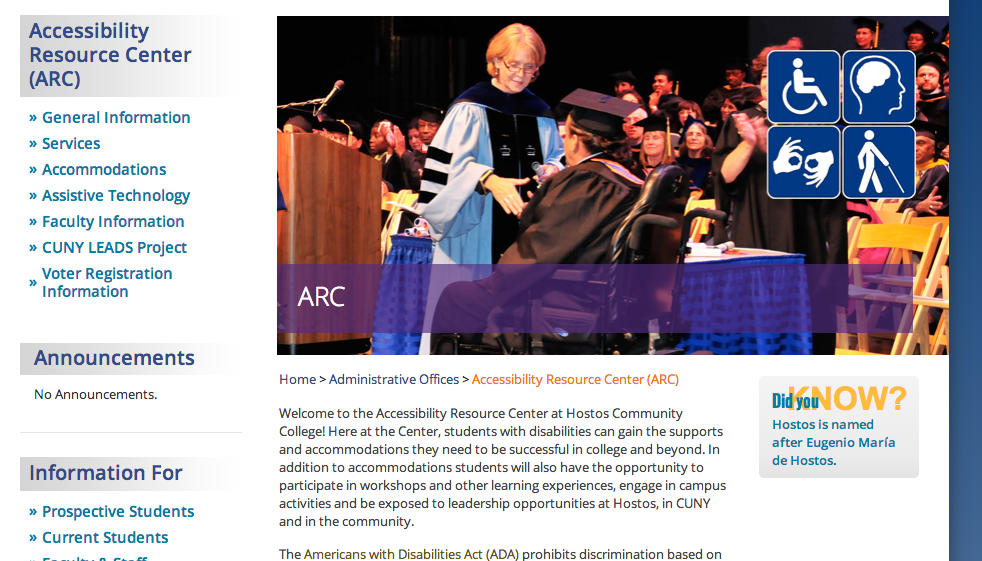
Image shows a screenshot of the webpage for the Accommodation Resource Center at Hostos Community College. Large banner shows a professor in regalia shaking hands with a graduating student using a wheelchair.
In the past, Disability studies scholars have often expressed a blatantly critical stance on the work of disability service provision. As legal-medical authorities within the broader administration of the contemporary corporate university, DSPs hold significant power over the students they work with: they get to determine if the student has provided sufficient proof of legitimate disability, and they get to decide what is a “reasonable” accommodation for the student to receive. This routine administrative requirement to provide or deny accommodations to a student can have powerful consequences, both in terms of student success and in terms of the substantial financial investment associated with some accommodations. As Tanya Tichkosky argues in her 2011 monograph on questions of access and disability in higher education, the current bureaucratic system of disability accommodation, as administered by DSPs, reinforces the commonplace notion that disability is a problem that individual disabled people need to deal with, that it’s a personal problem caused by the disabled person’s impairments (9). This mentality, Tichkosky and many others argue, leads administrators and faculty alike in the university system to believe that disability is only an issue when there are disabled people around, thus hindering them from recognizing disability as a social phenomenon produced when spaces, curricula, and cultural conventions are designed to accommodate only a limited portion of the population. We can add to this theory-based criticism the plethora of disability service horror stories told by disabled students and scholars alike who have been denied services for offensive reasons or put through undue hardship to prove their disability before receiving legally guaranteed accommodations (see, for example, this recent piece: “Why Are Huge Numbers of Disabled Students Dropping Out of College?”)
If we judge based only on the perspectives published in disability studies or the anecdotal experience of WPAs and faculty, the best image most of us get of DSPs is that they’re well-meaning bureaucratic functionaries, rubber stamps, paper pushers – perhaps at worst, they appear to be adversaries to both progressive disability activism and faculty autonomy alike.
For me, as a student of Writing Program Administration scholarship, I tend to be wary of arguments that draw us/them battle lines between administrators and faculty, regardless of the disciplinary context. WPA scholars like Richard E. Miller and Donna Strickland have argued that while faculty (especially politically progressive, activist intellectuals) tend to distance themselves from the work of done by management, the fact is that university work at all levels exists within a matrix of bureaucratic control and administratively sanctioned access.
Strickland, for example, claims that composition studies, despite the forty year history of established Writing Program Administration scholarship and professional identity, continues to repress the managerial aspects of our profession in what she terms the “managerial unconscious” of the field. We go to extreme lengths to bill ourselves as teachers and theorists, repressing the fact that it is our talent for working with and within the administrative constraints of the university system that gives us the ability to execute new programs and grow our field. Miller, in his historical study of experiments in progressive reform in higher education, argues that rather than distancing ourselves from administrative roles on political grounds, faculty and WPAs alike should learn to see ourselves as “intellectual-bureaucrats;” we should acknowledge, he argues, that the bureaucratic aspects of our labor as a source of knowledge and site of scholarship, as well as, ultimately, a mechanism for progressive change. He writes,
To pursue educational reform is thus to work in an impure space, where intractable material conditions always threaten to expose rhetorics of change as delusional or deliberately deceptive; it is also to insist that bureaucracies don’t simply impede change: they are social instruments that make change possible (Miller qtd in Strickland 12).
Here Miller describes the reality that anyone who would work for progressive change in the landscape of higher education must confront the messy, vexed reality of bureaucratic life. Disability Service Providers, like WPAs, confront every day the “intractable material conditions” of disability administration. Instead of seeing DSPs as mere bureaucratic functionaries, I suggest we seek to know them as fellow intellectual-bureaucrats; to do this, we must look to the ways they have altered the bureaucratic landscape of higher education. In what follows, I will describe a large-scale ethnographic research study I am currently undertaking to increase our knowledge about the institutional work of disability service providers across a range of campuses of a large urban university system.
2. Disability Administration in CUNY
The City University of New York system (CUNY) is comprised of twenty-four institutions, including seven community colleges, eleven four-year colleges, three graduate schools, a range of cross-campus institutions, and a core managerial unit called CUNY Central Office.
Each teaching campus has its own autonomous disability services director with its own (centrally distributed) budget–all under the oversight of CUNY Central’s Assistant Dean of Student Affairs, Christopher Rosa. Those of you who are active in disability studies may recognize Rosa, who is himself a former DSP from one of the senior colleges, as a published disability scholar, prominent disability rights activist, and prominent member of the Society for Disability Studies, the organization the publishes the field’s most prominent journal (Biography,http://caaid.us/Bio3.html, accessed 16 July 2014).
As I’ve suggested, most faculty knowledge about disability administration and the DSPs who labor there is anecdotal, based on individual encounters between faculty, students, and service providers. This is true both of disability scholars and of WPA and writing scholars. Most people only know the disability service staff on their individual campus, which can lead to over-generalizations. Most critics of disability service provision speak of disability administration as if it were unchanging as well as unchangeable, a universal state of affairs. As we know from numerous studies of Writing Program Administration and assessment, administrations are always inflected by the material constraints and procedures of the local institution. Likewise, we must acknowledge that each encounter between critic and DPS is also isolated in time and removed from its broader historical context. Indeed, as my research on the administrative lives of two generations of CUNY disability service providers has already begun to reveal, the system has had a rich and dynamic history, full of change and innovation, often powered by the very activist imperatives at the heart of disability studies.
3. Methodology
My research consists of three main components. The first stage involves individual interviews with current and former DSPs from around the CUNY system. I have identified two primary populations, whom I will refer to as “old guard” and “new guard” DSPs. Old Guard began their work in the CUNY system either before the implementation of Section 504 of the Rehabilitation Act of 1973 (which wasn’t actually enforced until 1978) or they began their work as DSPs within the first decade of the legal mandate that college campuses be made accessible to people with disabilities. Because no established training or credentialing system existed for college disability administrators at the time the Old Guard started working on campuses, these individuals come from a range of professional backgrounds including clinical psychology, social work, sociology, and humanities fields. As might be expected, most of these old guard DSPs have retired and been replaced by the New Guard who inherited the administrative systems the Old Guard developed throughout the 1970s, 80s, and 90s. New Guard DSPs are more frequently professionalized for jobs in college disability administration, though certainly there still exists considerable diversity among this population.
Having identified a representative sample of Old and New guard DSPs, I am conducting individual interviews covering five main topics:
- the DSP’s professional background, including administrative training and experience with institutions of higher education;
- the DSP’s perception of disability service provision and its role on campuses (including their relationship to the broader administration or campus disability culture);
- the DSP’s approach to carrying out that role (including major causes championed, major projects undertaken, major hurdles encountered);
- the DSP’s characterization of the students receiving services through her/his office (including how student populations may have changed over time); and
- the DSP’s perspective on faculty awareness of disability issues and accommodation practices.
Following these individual interviews, I will be holding focus groups with different clusters of Old and New guard DSPs, with the aim of teasing out generational and professional differences among their perception of the DSP role.
In addition to these ethnographic components, I am also collecting a textual archive of documents produced by DSPs across the system relate to disability administration. The range of materials I am gathering includes
- publicly accessible administrative documents, like disability services websites, pamphlets, form letters, and other administrative documents;
- educational materials about disability issues, designed for students or instructors;
- non-confidential correspondence between DSPs from different campuses, or between DSPs and other branches of the administration, or between DSPs and members of the state legislature;
- scholarly writing published by DSPs based on their work on campuses; and
- curricular materials developed by DSPs for use in their student support programs.
My hope is that these written materials, which are not gathered in any established archive within the CUNY system, will provide evidence of the complex rhetorical work of disability service providers, not only as administrators of programs, but as producers of disability discourse in a way hitherto not acknowledged. (If anyone knows of a comparable archive anywhere, please let me know!)
4. Findings (so far)
I am still in the early stages of this project, conducting individual interviews and gathering my initial archival materials. At this point, I have spoken with three old guard DSPs and one New Guard, and through the course of these interviews gathered the names of other key players in the administrative history, whom I will be contacting over the next year. My aim is that by the end of Spring 2015 I will be completing my focus groups and developing my findings into both material for my dissertation and a standalone oral/textual history project.
5. Discussion
At this point I can make a few general observations based on the insights that are emerging from the research so far.
A) Council on Student Disability Issues
One important finding from my interviews so far is the central position collaboration has played in the professional lives of CUNY DSPs. Indeed, in her or his own way, each interview subject attested to the importance of CUNY’s campus-wide Council On Student Disability Issues (COSDI). COSDI, which is comprised of the directors of disability services from each of the campuses, has long served as a hub of disability discourse within the CUNY system (COSDI, http://catsweb.cuny.edu/?page_id=880, accessed 16 July 2014).
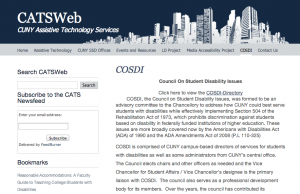
Image shows a screenshot from the CATSWEB page, explaining the organizational structure and objectives of COSDI. Page banner shows the skyline of New York.
For DSPs isolated on different campuses, COSDI meetings and shared correspondence provides a venue for sharing local issues and workshopping novel solutions to administrative problems. In the early days of disability administration, when administrative policies and best practices were still being developed, this organization served as a forum for debate, a staging ground for collaborative action, and a space for mutual support among often beleaguered professionals.
So far, I have managed to piece together portions of the organizations’ history from my interviews with the Old Guard DSPs, all of whom served as co-chairs of COSDI at some point in the past. It has become clear, however, that a more thorough investigation of this organization will be key to my research. I have not yet assessed the quantity of meeting minutes or internal documents that still exist from the first decades of the organization’s history. These may prove to be key in understanding the development of disability administration in the CUNY system.
B) Beyond Disability Management
A second key revelation of my interviews so far relates to the diverse nature of the non-managerial work performed by DSPs in the system. For now I will break this labor into three categories: political, pedagogical, scholarly.
Two Old Guard DSPs I interviewed, both with professional backgrounds in social work, reported being involved in local state politics as part of their work as DSPs and members of COSDI. One told a story of how in the early 1980s, COSDI members, who had to this point had no stable budget lines for their offices, decided to lobby the state capitol for a annual allocation of funds for disability services in CUNY. Using data meticulously gathered by COSDI members over the early years of their work, and bolstered by student activist groups that COSDI members had helped form on their home campuses, COSDI successfully lobbied Albany and secured a stable annual allocation that is still the primary source of funding for disability services to this day.
The third Old Guard DSP I spoke with shied away from the more political work of COSDI; as a trained psychologist with a background working as a school counselor both in Brooklyn elementary schools and for the New York Department of Education, he preferred to engage with the DSP role from a pedagogical and counseling perspective. This DSP, who helped establish the CUNY Learning Disabilities Project, described to me a number of pedagogical innovations he designed and implemented during his time as DSP at one of the CUNY community colleges. For instance, he developed a two-semester, credit-bearing course sequence for students in academic distress (not all of whom had documented disabilities), a course sequence that integrated into one curriculum that he co-taught a mix of introductory literacy instruction, student support, and self-advocacy coaching. He also produced faculty development materials to help instructors adapt their teaching practices to be responsive to principles of universal design, including insights from developmental psychology about multiple and multisensory learning styles.
Finally, I want to give a few examples of the scholarly work of these DSPs. COSDI members were responsible for producing a range of publications that were published within the CUNY system. For example, one Old Guard DSP whom I haven’t interviewed yet co-authored Dispelling the Myths: College Students with Learning Disabilities a comprehensive guide for instructors and administrators about relevant research on Learning Disabilities and best practices for accommodating instructional practice to accommodate their needs.
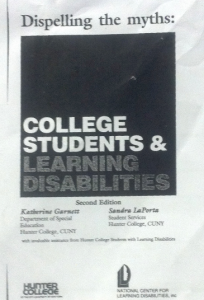
Image shows cover page of Dispelling Myths: College Students and Learning Disabilities, second edition, written by Katherine Garnette and Sandra LaPorta, 1991
I should note that in a move that sets this 1991 document ahead of most similar documents circulated even today, Dispelling the Myths incorporates student perspectives in the form of first person narratives and also addresses issues of social stigma and faculty ignorance as factors that make universities particularly disabling spaces for people with LD. This focus on the environment as the problem, rather than the disabled persons’s deficiency, is consistent with current disability studies approaches. Scholarship like this, created by intellectual-bureaucrats working just a few departments over from Hunter College’s WPAs, could serve as a valuable model for our own field, which continues to struggle in moving beyond purely medicalized views of invisible disabilities like LD.
One further example shows some of the discursive complexity evidenced by this history. Here I reproduce the abstract and first page of an essay titled “Clinician, Administrator, Education: Reconciling the Roles” by Anthony Colarossi. Colarossi, the school psychologist turned DSP I discussed earlier. This essay, which Colarossi presented as a talk at the 1988 conference of the Association on Higher Education and Disability (AHEAD), reasons through the complex institutional positioning of the DSP role. In a narrative that would ring true to many WPAs, he describes how the multiple roles DSPs serve often conflict, necessitating difficult compromises between his ethical imperatives as an educator and his professional obligations as an administrator.
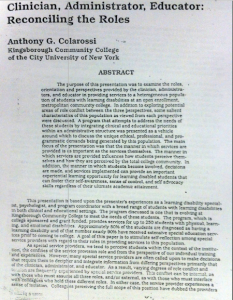
Image shows first page of Anthony Colarossi’s essay “Clinician, Administrator, Educatior: Reconciling the Roles” as published in the conference proceedings of the 1988 AHEAD conference
While Colarossi describes a range of programs he developed for learning disabled students on his open-admissions campus, he concludes that it is “the manner in which services are provided is as important as the services themselves.” Here, while acknowledging the substantial administrative constraints working against DSPs performing their jobs with adaptability and sensitivity, he resolutely acknowledges the need for DSPs to deal with the social and cultural forces that produce the isolation and stigma disabled students so often experience. Again, this should sound familiar to this audience.
Again, sentiments like these should be familiar to us as WPAs: our own scholarship attests to the difficulty of swapping among the hats of our composite pedagogical/administrative roles, the struggle to remain sensitive educators while also managing ornate and expansive systems. If this published talk is representative of the kind of discourse that has been exchanged among COSDI members throughout the years, we may have much to learn from recovering this discourse.
6. Conclusions and Leads
I will conclude with the final insight from my research so far: a lead, really, a new question to test that has emerged through my conversations. All of the Old Guard DSPs reported perceiving a generational split in terms of approach to disability service provision between themselves and the New Guard. Whereas Old Guard characterize the early years of disability services as being rich with innovation, they frequently remarked that disability services had become progressively more routinized over the years. They spoke of New Guard DSPs as having inherited relatively stable administrative systems, systems that they have not continued to innovate and develop with the same activist mentality as the Old Guard had. Obviously, this kind of assessment, coming from the Old Guard, will need to be balanced by perspectives from the New Guard.The one New Guard DSP I spoke with was too new to the system to have a strong perspective on this topic.
However, this belief from the old guard offers some intriguing possibilities for my study as I cary it forward. If current disability studies scholars are correct that some (or even many) DSPs today approach their role primarily as managerial functionaries of disempowering disability administrations, perhaps it has not always been this way. Perhaps by investigating the way the role of disability service providers have changed over time–how they have morphed, expanded, diversified, or unified–we will learn something important about the work of intellectual-bureaucrats in the contemporary managed university. The tools of WPA and comp/rhet scholarship will be particularly useful in this project, especially our methodologies of archival history, ethnography, and rhetorical analysis. We may discover lessons that we as WPAs can benefit from, especially as we accept disability activism as part of our own role on college campuses. This history, I believe, will teach us something about how our colleagues across the campus and across time have learned to, in Richard Miller’s words, “[tinker] at the edges margins of the academy,” how they have worked institutional change in the only way it’s really possible from within the current system, by “discovering the possibilities that emerge when one sets out first to enumerate and then to work on and within extant constraints” (212). I am eager to report back with more as my research continues.
7. Works Cited
Colarossi, Anthony. “Clinician, Administrator, Education: Reconciling the Roles,” Published with conference proceedings from the 1988 AHEAD conference.
Garnette, Katherine and Saundra LaPorta. Dispelling the Myths: College Students with Learning Disabilities. New York: Hunter College, 1991.
Miller, Richard E. As If Learning Mattered: Reforming Higher Education. Ithica, NY: Cornell UP, 1998.
Smith, E. E., “Why are Huge Numbers of Disabled Students Dropping Out of College?” Alternet.org 20 June 2014. Accessed 17 July 2014.
Strickland, Donna. The Managerial Unconscious in the History of Composition Studies. Southern Illinois UP, 2011.
Titchjosky, Tanya. The Question of Access: Disability, Space, Meaning. University of Toronto Press, 2011.
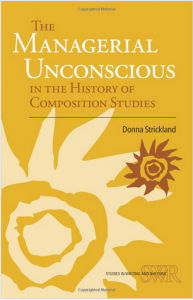
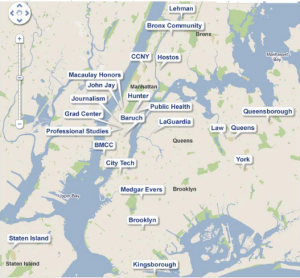


Excellent presentation!